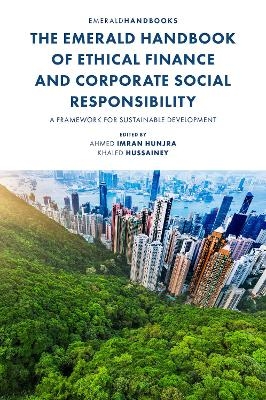
The Emerald Handbook of Ethical Finance and Corporate Social Responsibility
Emerald Publishing Limited (Verlag)
978-1-80455-407-4 (ISBN)
Ethical finance involves financial practices that consider environmental, social, and governance (ESG) factors affecting a borrower and/or its assets. This approach extends beyond traditional financial metrics, aiming to align investments and lending with principles promoting sustainability, social responsibility, and effective governance.
While previously confined to specialized finance providers and investors supporting environmentally or socially focused enterprises, this paradigm has shifted into the mainstream. According to the Global Ethical Finance Forum, the management of ethically driven assets worldwide has exceeded $27 trillion, indicating a growing recognition of the importance of integrating ESG factors and values into financial considerations.
Individual and professional investors increasingly acknowledge the pivotal role played by ESG variables in determining risk and reward. In the evolving landscape of investment and finance, ethical standards have become the norm, offering crucial safeguards for informed investment and finance decisions. Instances where funds and lenders are perceived to neglect appropriate ESG considerations in their decision-making processes now face heightened scrutiny and questioning.
The Emerald Handbook of Ethical Finance and Corporate Social Responsibility: A Framework for Sustainable Development presents a novel perspective on ESG considerations and the implementation of Corporate Social Responsibility (CSR) for sustainable development. This approach carries global and enduring implications.
Ahmed Imran Hunjra, Associate Professor at Rabat Business School, International University of Rabat, Morocco Khaled Hussainey, Professor of Accounting at The University of Portsmouth, UK
Chapter 1. The Concept of Materiality in CSR and SDGs reporting: Definitions, Interpretation, Application, and Sustainable Value Creation; Nadia Gulko, Flor Silvestre Gerardou, and Nadeeka Withanage
Chapter 2. The Impact of Adopting Sustainable Innovative Cropping Systems in the Mediterranean region: Case of AIX-EN-PROVENCE; Rachida Khaled
Chapter 3. CEO attributes and CSR reporting in Jordan: New insight from the COVID-19 pandemic period; Belal Ali Abdulraheem Ghaleb, Sumaia Ayesh Qaderi, and Faozi A. Almaqtari
Chapter 4. Direct and indirect effects of external public debt on Tunisian’s sustainable economic Development; Channoufi Sabrine
Chapter 5. Co-Word and Bibliometric Analysis of the Sustainability Reporting in Islamic Banks; Mariam Ahmed, Fatma Ahmed, and Khaled Hussainey
Chapter 6. Corporate Social Responsibility and Sustainable Development in the United Arab Emirates: A Survey of the Legal Framework and Empirical Evidence; Mohamed Chakib Kolsi, Ahmad Al-Hiyari, and Khaled Hussainey
Chapter 7. Does whistleblowing policy constrain earnings management? Evidence from an emerging market; Mohsen Anwar AbdElghaffar Saleh, Dejun Wu, and Azza Tawab AbdElrahman
Chapter 8. Corporate social responsibility in the boardroom: Evidence from a developing context; Esam Emad Ghassab, Carol Ann Tilt, and Kathyayini Kathy Rao
Chapter 9. Estimation of Convex and Non-Convex Meta frontier production set with the DEA-Bootstrap Approach: Evidence from Data Banks; Ezzeddine Delhoumi and Faten Moussa
Chapter 10. ESG communication in the annual reports of financial institutions: evidence from Morocco; Farrat Outmane, Hajji Zouhair, and Benabdallah Hamza
Chapter 11. Sustainability Issues: The Role of IFAC and its Effect on Auditors Attitude in industrial companies; Ahmed Helmy Mohamed Gomaa Mohamed
Chapter 12. CSR Disclosure Quantity VS Quality and Financial Performance: A comparative study between Islamic Banks outside the crisis; Ferdaous Abdallah and Adel Boubaker
Chapter 13. The gender composition of corporate boards and firm performance; Muhammad Umer Mujtaba, Wajih Abbassi, and Rashid Mehmood
Chapter 14. Integrating ESG with Corporate Investment Decision Making; Muhammad Irfan Khan and Athar Iqbal
Chapter 15. CSR disclosure in the Syrian Islamic bank: Motivations and Challenges; Emad M. Hashem Otri, Reza Kouhy, Salem Eltkhtash, and Christopher Tribble
Chapter 16. Does Corporate Social Responsibility Influence Corporate Innovation?; Mehwish Ali, Majdi Hassen, and Sarmad Saeed Sheikh
Chapter 17. Corporate Social Responsibility: An Islamic Shari'ah-Compliant Perspective; Ahmed Hassanein and Hana Tharwat
Chapter 18. Sustainable Finance for Implementing the Sustainable Developments Goals in West Asia; Hind Dheyaa Abdulrasool and Khawla Radi Athab Al-Shimmery
Chapter 19. Forecasting ESG Index Effect on the Stock Returns: Evidence from G7 economies; Nousheen Tariq Bhutta, Anum Shafique, Muhammad Arsalan, and Hifsa Hussain Raja
Chapter 20. The Impact of Social Mechanisms and Reputation on Stakeholders’ Perception of Responsible Service: Evidence from Student Experience at Uk Universities; Rasha Ashraf Abdelbadie, Nils Braakmann, and Aly Salama
Chapter 21. The impact of Traditional versus Ethical Investment on Financial performance of Distressed and non-distressed firms in south Asian Emerging Economies; Bushra Zulifqar, Muhammad Arshad Mehmood, Akmal Shahzad Butt, and Anum Shafique
Chapter 22. CSR and Sustainability in HEIs: A Systematic Review towards Future Development; Gul Afshan, Zubaida Ashraf, Maryam Kalhoro, Sonia Sethi, Qurat-ul-Ain Memon, and Mansoor Ahmed Khuhro
Chapter 23. Business Ethics Codes and CSR Practices: Analysis of Codes of Algerian Companies in the Oil and Gas Sector; Rachida Sahraoui and Abderrahmane Laib
Chapter 24. Corporate social responsibility and tax avoidance: Does earnings performance matter?; Ines Bouaziz Daoud and Amani Bouabdellah
Chapter 25. Integrating Enterprise Risk Management on the Nexus of Sustainability Reporting and Firm Performance: A Conceptual Study; Syed Quaid Ali Shah, Lai Fong Woon, Muhammad Kashif Shad, and Salaheldin Hamad
Chapter 26. Does corporate culture promote environmental engagement deployment? A multi-site case study of a Moroccan industrial group; Walid Simmou, Anas Hattabou, and Samira Simmou
Chapter 27. The effect of adopting corporate social responsibility on tax avoidance practices through the compliance with corporate governance mechanisms; Tariq H. Ismail, Esraa Saady Mohamed Zidan, and Emad Ali Seleem
Chapter 28. Building a Sustainable Future: The Impact of Corporate Social Responsibility on Firms sustainable development; Mirza Muhammad Naseer and Tanveer Bagh
| Erscheinungsdatum | 16.04.2024 |
|---|---|
| Verlagsort | Bingley |
| Sprache | englisch |
| Maße | 152 x 229 mm |
| Gewicht | 1016 g |
| Themenwelt | Wirtschaft ► Betriebswirtschaft / Management ► Finanzierung |
| Betriebswirtschaft / Management ► Spezielle Betriebswirtschaftslehre ► Bankbetriebslehre | |
| Wirtschaft ► Betriebswirtschaft / Management ► Unternehmensführung / Management | |
| ISBN-10 | 1-80455-407-3 / 1804554073 |
| ISBN-13 | 978-1-80455-407-4 / 9781804554074 |
| Zustand | Neuware |
| Haben Sie eine Frage zum Produkt? |
aus dem Bereich


